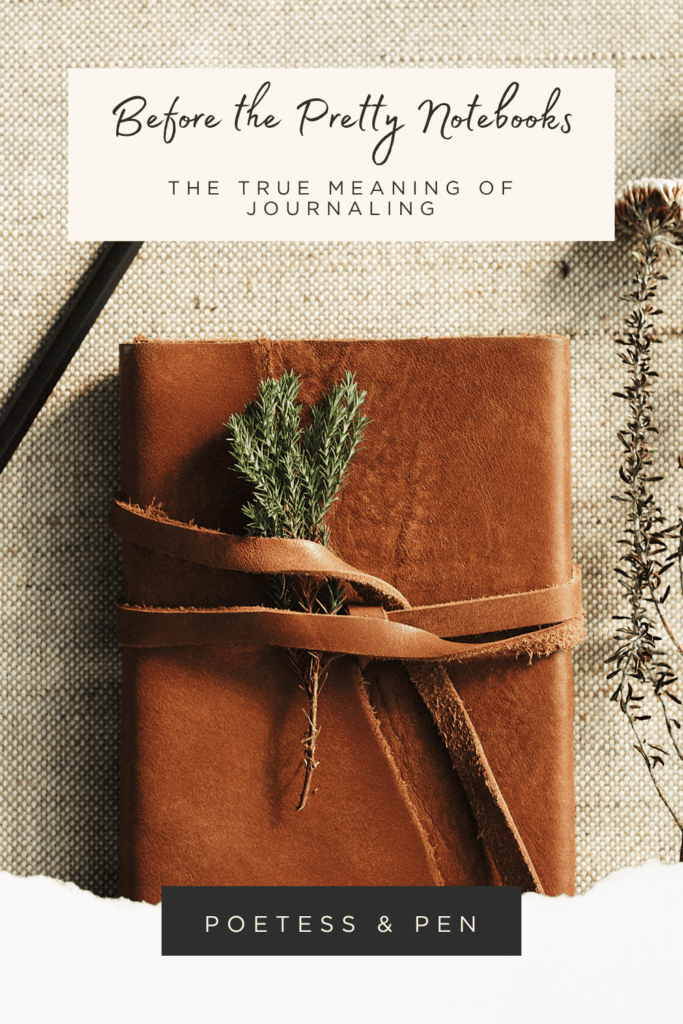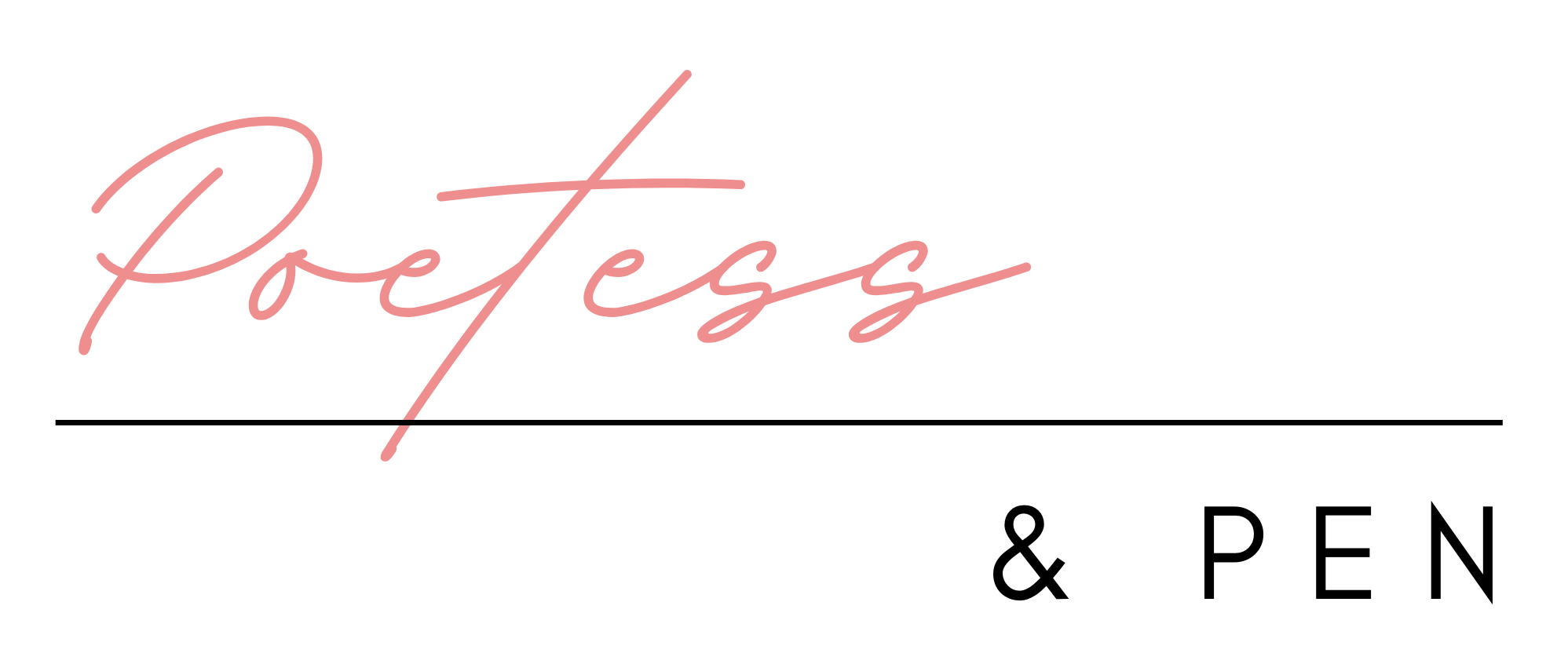There was a time when journaling felt simple—no rules, no prompts, no pressure to make it look lovely. Just a pen, a quiet corner, and a mind that needed somewhere to rest.
And then along came Pinterest and Instagram.
These days, journaling has become a project. We scroll through photos of flawless pages, perfect handwriting, and washi-taped margins, and somewhere in the back of our minds we start to believe that if it doesn’t look like that, it doesn’t count.
But journaling was never meant to be performance art. It’s not a productivity tool or a way to prove that you’re growing. The true meaning of journaling is far more human—and far more sacred. It’s a pause in the middle of the noise, a way to catch your breath and listen to what’s stirring beneath the surface. It’s where your thoughts meet your soul, where faith finds language, and where you remember that you are still becoming.
The page doesn’t ask for perfection. It only asks for honesty. You don’t need a fancy notebook, an aesthetic workspace, or a structured method. All you need is a willingness to meet yourself on the page—and the courage to stay long enough to hear what your heart is trying to say.
Journaling as Reflection
When we sit down with a blank page, we aren’t just recording life — we’re receiving it. Reflection is the art of slowing down enough to notice what’s happening within and around us before it rushes by. It’s how we make sense of our emotions, patterns, and choices. Each line becomes a mirror, gently showing us what we’ve been too busy or afraid to see.
Most of us spend our days reacting — to people, to headlines, to endless lists of things that must be done. Journaling invites us to respond instead. Reflection gives space for pause. When you write about your day, you’re not just recalling what happened; you’re uncovering what it meant. Maybe you notice that a conversation left you uneasy, or that a simple act of kindness softened something hard in you. Reflection transforms moments into meaning.
To reflect through journaling is not to analyze every detail or fix every flaw. It’s to learn the rhythm of honesty. It’s to ask, What stayed with me today? What is my heart trying to teach me? Sometimes, the answers rise quickly; other times, silence speaks louder than words. Either way, the act of slowing down to look inward begins to soften the edges of a hurried life.
If you’re not sure where to begin, try this: write one line that starts with, “Today I noticed…” and keep following that thread. You might find that the smallest observation — a slant of light on the kitchen counter, a sentence that lingered, a quiet ache you didn’t name — becomes the doorway into understanding yourself just a little more.
Journaling as Conversation
Every time your pen touches paper, you begin a conversation — not the kind that demands replies, but the kind that invites revelation. Journaling is a dialogue between your thoughts and your truth, your questions and your faith, your past and your becoming. It’s where the noise in your mind begins to settle, and the quiet voice of wisdom finally has room to speak.
Sometimes that conversation sounds like sorting through the clutter of a long day. Other times, it’s a tender exchange between who you are and who you’re learning to be. You might write to your younger self — the one who still feels uncertain — or to your future self, offering reassurance that she’ll find her way. And then there are moments when your words turn heavenward, and journaling becomes prayer — not polished or proper, just raw and real.
Conversations on the page don’t need tidy endings. You can write questions you don’t yet have answers for, and that, too, is a kind of faith. The page can hold confusion and clarity, anger and grace, all side by side. Over time, you begin to recognize that this quiet exchange is teaching you how to listen — not just to the world, but to the whisper of your own soul.
If you want to begin this kind of journaling, write a letter tonight. Address it to whoever needs to hear from you most — yourself, a loved one, or God — and let the words unfold naturally. Don’t edit, don’t plan. Just respond. Somewhere in that honest back-and-forth, you’ll find what you’ve been trying to say all along.
Journaling as Prayer
There’s a sacred hush that falls when your thoughts turn heavenward — when the words that spill onto the page stop being mere sentences and become something softer, deeper, holy. Journaling as prayer is not about writing perfect praises or carefully constructed devotionals. It’s about sitting still enough for your soul to speak honestly before God.
On paper, prayers often look different than the ones whispered aloud. They ramble. They wander. They repeat themselves. They question. But that’s the beauty of them. The page doesn’t rush you to the “right” answer or interrupt your tears. It simply receives. In a world where faith can feel hurried or performed, journaling becomes a place to be unfiltered — where gratitude and grief can coexist in the same breath.
Write your prayers the way you live them: unfinished, human, tender. Begin with what’s real — “Lord, I don’t understand…” or “Thank You for this small mercy I almost missed.” You don’t have to force eloquence; truth is enough. As ink meets paper, worries begin to loosen their grip, and the heart starts to remember who’s been holding it all along.
Some days, your journal will feel like an altar — a place to lay down your fears, your dreams, your exhaustion. Other days, it’s a quiet chapel for a single whispered word: “Help.” Either way, the act of writing itself becomes worship — not because it’s perfect, but because it’s personal. And in those pages, where faith meets honesty, prayer becomes more than words; it becomes presence.
What Journaling Is Not
Somewhere along the way, we started believing that journaling had to look a certain way. We see pages with flawless handwriting, watercolor borders, and neatly organized trackers, and we assume that’s the standard. We think journaling requires discipline, structure, or a life interesting enough to fill the lines. But that’s not what journaling was ever meant to be.
Journaling is not a performance. It’s not something you do to prove you’re introspective, creative, or productive. You don’t have to show anyone your words, and they don’t have to inspire or impress. The page isn’t a stage — it’s a sanctuary. It’s where you can say the things you’re not ready to voice aloud, and where you’re free to write badly, skip days, and contradict yourself.
It’s also not about perfection or consistency. The goal isn’t to build an archive of polished entries but to offer yourself a place of truth. Some days you’ll fill ten pages; other days, you’ll scrawl one sentence and close the cover. Both count. What matters is the moment of connection — that brief pause where your hand slows down enough for your heart to catch up.
And journaling is not about performance metrics or productivity. You don’t need a morning routine checklist or color-coded system. You just need presence. A willingness to notice, to name, to release. When you stop treating journaling like something to master, it becomes something to cherish.
So let go of the pressure to make it pretty or perfect. Let your handwriting wander. Let your sentences be messy. The page was never asking you to impress it — only to meet it honestly. Because the truest journals aren’t the most beautiful ones; they’re the most real.
Why This Matters
It might seem small — this simple act of writing what you feel, what you remember, what you can’t quite say out loud. But journaling changes the way you move through the world. When you take time to notice, to name, to reflect, you begin to live more awake. The moments you once brushed past start to shimmer with meaning. The ordinary becomes holy.
Journaling matters because it slows the rush. It gives shape to thoughts that would otherwise dissolve in the noise. It teaches patience in an impatient world, compassion toward the parts of yourself you usually criticize, and awareness of blessings that slip by unseen. Writing becomes both anchor and release — a way to hold what’s worth keeping and let go of what’s too heavy to carry.
It also matters because it restores intimacy with your own soul. We spend so much of life performing — at work, at home, online — that we forget how to simply be. The page invites you back. Here, there’s no need to measure up, no audience to please, no checklist to complete. Only truth. Only grace.
Over time, your journal becomes a quiet record of growth — not in accomplishments, but in understanding. You’ll look back and see not just who you were, but how far you’ve come in learning to listen. And perhaps that’s the greatest gift of journaling: it reminds you that your life, as it is right now, is already worth writing about.
Closing Thoughts
You don’t need to wait for a perfect moment or a beautiful notebook to begin. You can start right here — with the pen you already have and the life you’re already living. Journaling isn’t about collecting words; it’s about collecting awareness. It’s the quiet act of turning your attention inward, of meeting yourself on the page and realizing you were never as lost as you thought.
So tonight, before bed, open a blank page. Take a deep breath. Write one true thing — just one. Maybe it’s something small: “The light through the kitchen window felt kind today.” Or something weighty: “I’m still grieving, and I don’t know what to do with it.” Whatever it is, let it be honest. That’s how you find your way home to yourself — one sentence of truth at a time.
The page doesn’t need you to be profound; it just needs you to be present. When you stop trying to write beautifully and simply write what’s real, your words begin to breathe. They become prayer, memory, reflection — your life unfolding in ink.
Write not to remember your days, but to meet yourself within them.
🖋️ Journal Prompts
1. If journaling wasn’t about remembering, what would you write today?
2. Write a letter to yourself that begins, “Dear soul, I’ve missed you.”
3. Describe one small, overlooked moment from your day and what it revealed about you.
💌 Before You Go
If this article spoke to you, you’ll feel right at home in our Poetess & Pen Facebook community — a quiet corner for women who love journaling, poetry, and the art of slowing down.
It’s where we share writing prompts, gentle encouragement, and glimpses of everyday grace. Bring your notebook, your coffee, and your honest heart — we’ll be there waiting.
👉 Join the Poetess & Pen Facebook Group and start writing your story alongside kindred souls.

What does “the true meaning of journaling” really mean?
It means journaling isn’t about making something beautiful or impressive — it’s about being honest, reflective, and present. It’s less about what you produce and more about what you notice.
Why do you say journaling is a reflection, conversation, and prayer?
Because journaling can mirror your thoughts back to you, let you speak openly with yourself or God, and help your spirit find peace through written prayer. It’s one act with many layers of meaning.
Do I need a pretty notebook or structured system to do this well?
No. Your journal can be a spiral notebook, a scrap of paper, or even the back of an envelope. What matters is presence, not polish.
How is this kind of journaling different from keeping a diary?
A diary records what happened; journaling reflects on why it mattered. It moves from fact to feeling — from documenting life to discovering it.
What if I feel too ordinary or uninspired to write?
Start anyway. The ordinary holds more beauty than you think. One small, sincere sentence — “I’m tired but grateful” — is enough to begin.
📖 Glossary
- Reflection: The practice of slowing down to see your thoughts and feelings clearly.
- Presence: Being fully aware of yourself and your moment while writing.
- Conversation Journal: A style of journaling that allows you to speak honestly with yourself or with God.
- Mindful Writing: Writing with awareness and intention, noticing details without judgment.
- Soul Work: The deep, quiet practice of nurturing emotional and spiritual growth through reflection.



